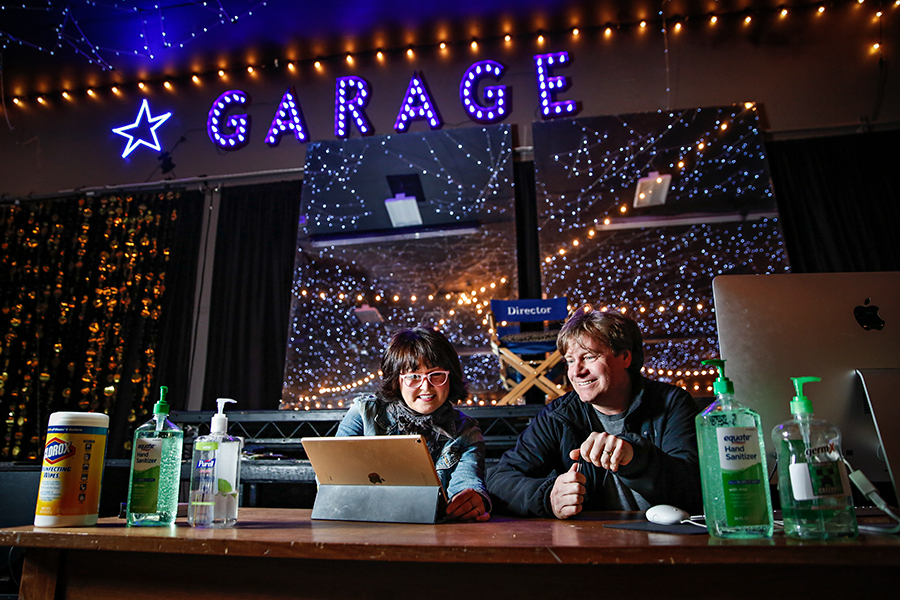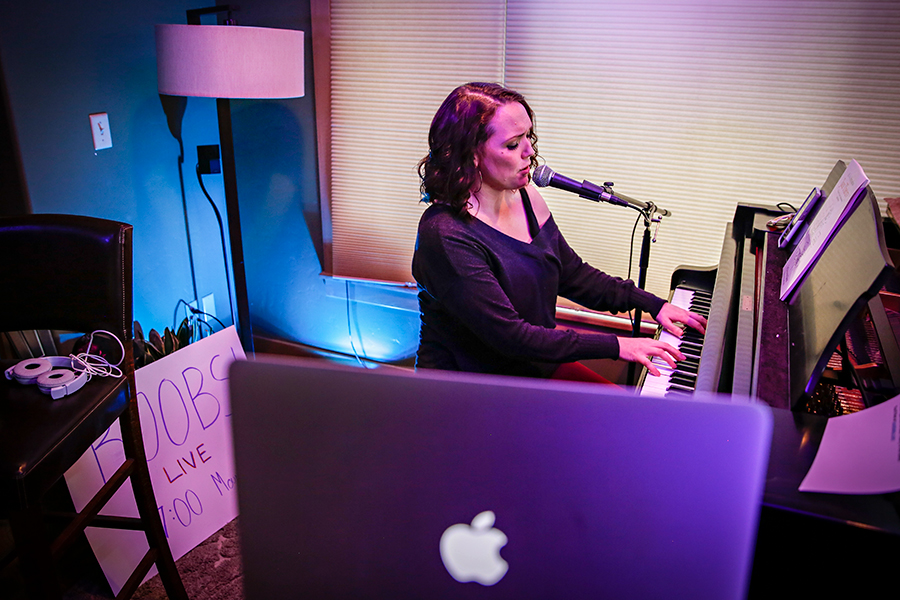Creativity in a Time of Crisis
As a global pandemic halts routine life across the country and in the Flathead Valley, local artists soldier on entertaining the masses and helping their community
By Justin Franz
They had been preparing for the show for weeks when the entire world came to a screeching halt.
Luke Walrath, Betsi Morrison and a cast of young actors had been preparing to perform Mel Brooks’ musical “Young Frankenstein” in late April as part of the Alpine Theatre Project’s annual youth education project when coronavirus reared its head and changed daily life almost overnight. Suddenly, the theater where the show was scheduled to take place was shuttered and officials were discouraging gatherings of 10 or more people.
Walrath and Morrison, the husband-and-wife team behind ATP since 2004, would have been forgiven for throwing in the towel and canceling or postponing the show — after all, just about everything else has been canceled in recent weeks. But Morrison said calling it quits was simply not an option.
The ATP crew isn’t alone either. While theaters, galleries and music venues have closed their doors, local creatives are still working, often without pay, to offer a bit of light during a dark time.
“We could have thrown up our hands and just given up, or we could turn this into some sort of crazy and creative experiment,” Walrath said. “We didn’t want to just give up.”
Instead of canceling “Young Frankenstein,” Walrath and Morrison decided to move the show entirely online. In the last week, the cast of “Young Frankenstein” has been rehearsing their show using services like Zoom video conferencing and FaceTime, to either meet as a full cast or in small groups.

Early on, Walrath and Morrison thought they might be able to record the show all online using Zoom, but they quickly realized that slow or inconsistent Internet connections would make singing in unison all but impossible. So Walrath came up with a workaround: He would create a scratch track — a rough play-through of a song — and send it to every cast member who could then play it with headphones on while they sang their own parts (This way, everyone is singing at the same pace). Once each cast member has sung their part, they will send the recording back to Walrath, who will edit it into one cohesive track.
“Its unchartered territory,” Walrath said. “We’re creating a musical film remotely … I don’t think I’ve ever heard of anyone doing something like this.”
They also had to figure out how to film the show. Instead of bringing everyone together, they’re sending each cast member a costume — either through the mail or by dropping it off outside their house — along with the material to make a green screen inside their own home. They’re also sending instructions on how to properly light themselves. Then each cast member will film their part and send it to Morrison, who will edit the footage together. Morrison is also story boarding every scene so the actors know which way they need to face when filming themselves.
“We’ll be using a lot of video trickery to make it seem like all of the kids were talking to each other at the same time and place, even though it will all be pre-recorded,” Walrath said.
“Young Frankenstein” will be made free to the public on ATP’s website on April 26 at 7 p.m.
But ATP isn’t the only one looking to ensure the show goes online. Local musician Erica von Kleist, a New York-trained jazz saxophonist and flautist, performed her one-woman comedy musical “Boobs” online on March 28. Von Kleist said she put the show online as both a way to entertain people stuck at home and promote her new album.
“People are turning to the arts right now and I’m so proud to be an artist,” she said. “I just hope people realize how important the arts are. I hope they realize that the arts are what is keeping us together.”
Von Kleist also organized a GoFundMe page called the Montana Music Relief Fund to help musicians who have lost gigs because of the statewide closures of bars and other venues. Von Kleist hopes to raise money to be distributed to musicians across the state to help them make ends meet. Artists are able to apply for grants.

“A lot of musicians make their living by doing gigs, but when hotels, bars and restaurants all close, suddenly their income is gone,” she said. “You might not think much about that $5 cover you’re paying at the Great Northern Bar, but all those cover charges together can pay an entire band.”
While some artists are adapting their craft to help distract people, others are finding inspiration from the situation itself, including local musician Nick Spear. When toilet paper began disappearing off the shelves a few weeks ago, Spear wrote a song called “Quiet Little Town” about it. Spear said many of his songs in the past have tackled serious topics, like climate change, with humor, and this was no exception.
“There are real serious things happening,” he said. “But I wanted to give people a distraction and a reason to laugh at the surreal absurdity of stores running out of toilet paper.”
Spear said he had a few of the song’s lyrics bouncing around in his head long before anyone had heard of toilet paper shortages. Over the course of a few days in mid-March, Spear had written and recorded the song and filmed a short music video that has since been viewed thousands of times. So far, the reaction to the song has been overwhelmingly positive.
Rob Akey, a Whitefish-based landscape artist and president of Montana Painters Alliance, said he’s also thinking about how the ongoing situation will influence his work. Akey said, as a landscape painter, most of the people who buy his work want to capture places and times that make them happy, but he thinks it’s important to depict the reality of the world as well.
One of his most popular paintings depicts downtown Whitefish on a warm sunny day. The painting is almost a perfect version of downtown, with a few people and cars sprinkled about. But last week, when he went on a walk through downtown with his wife, Akey was struck by Central Avenue’s emptiness. Although a painting of a deserted and gloomy downtown Whitefish might not be a popular seller, Akey thought he should put it to canvas.
“Art should hold a mirror to society, and this is where we are right now,” he said. “I sort of think it’s our obligation to paint it.”
Akey said it has been hard to focus on his work at times. He worries about how the current situation will impact Montana’s art community in the years ahead, and just last week he received an email about at least one gallery he works with in the eastern part of the state that will close its doors for good. He likened the news to a “gut punch.”
But despite the bad news, Akey said he’ll keep pushing forward.
“You have to keep painting,” he said, “if only to stay sane.”